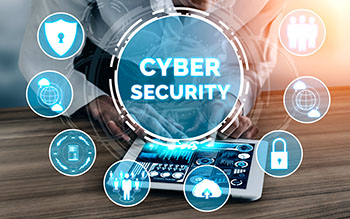
Since the onset of the COVID-19 pandemic, unsavory elements have been hyperactively probing computer networks everywhere for vulnerabilities. Unfortunately, the large numbers of Americans now working remotely provide plenty of targets.
This rise in cybercrime has attracted the attention of law enforcement at the highest levels. Calvin Shivers, assistant director of the FBI Criminal Investigative Division, told a U.S. Senate Judiciary Committee, “As of May 28, 2020, the Internet Crime Complaint Center received nearly the same amount of complaints in 2020 as they had for the entirety of 2019.” In August 2020, INTERPOL issued a report showing that the alarming rate of cyberattacks during COVID-19 was continuing and only likely to get worse.
Cyberattacks can lead to business disruption, financial loss, or possibly ruin for individuals and companies alike. November 30, 2020, is National Computer Security Day, and it is the opportune time to remind everyone to stay on guard.
All should remember these efficient precautions from The U.S. Department of Homeland Security that will go a long way toward preventing successful cyberattacks.
- Set secure passwords and keep them secret. Avoid using common words, phrases, or personal information in your passwords, and change them regularly. A combination of uppercase and lowercase letters, numbers, and special characters is generally best.
- Keep your operating system and other critical software up to date. Software providers typically provide security patches and updates for free. Each time any of the system performance updates comes in, attempt to complete them promptly!
- Verify the authenticity of requests from companies or individuals by contacting them directly. Legitimate companies will not typically ask for sensitive information outside of a very secure environment. Don’t be shy about reaching out to the company to verify the legitimacy of the email.
- Pay close attention to website URLs. Malicious websites try to fool computer users with subtle misspellings (appple.com, goggle.com, etc.) or a different domain (for example, .com instead of .net). Take a moment to look before you click.
- Be suspicious of unknown links or requests sent through email or text message. Never click on any out of the ordinary links or answer strange questions sent to your computer or mobile device, regardless of who the sender appears to be.
- Think carefully before opening an attachment. If an email with an attachment arrives unexpectedly or from an unusual source, be wary of opening it. Also, make sure that the option for automatic downloads is off.
- Install and maintain antivirus software. Antivirus software recognizes malware and offers valuable protection for your computer. Understand, however, that no antivirus software is ever going be 100% effective against all malware.
Be aware that firewalls, VPNs, and all the antivirus software in the world are easily overcome by a single moment of carelessness on the part of any computer user within a network. It’s up to everyone in our teams to remain vigilant in safeguarding against the threat of cybercrime.
B11092001
Clicking third-party links will open a new tab and will take you away from AmeriLife.com. AmeriLife does not control the linked sites’ content or link.
